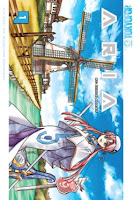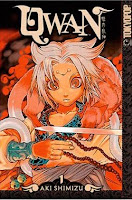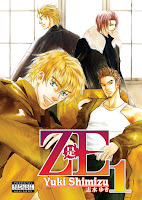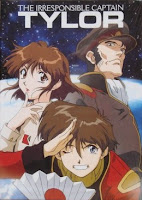My News and Reviews
This past week I posted two reviews. My first in-depth manga review in April was for Rohan at the Louvre by Hirohiko Araki. It’s a handsome hardcover volume with pages in full color. Araki’s artwork is fantastic. I really enjoyed the manga. Fun fact: It was commissioned by the Louvre Museum. I also reviewed the original Welcome to the N.H.K. novel by Tatsuhiko Takimoto which has had both anime and manga versions made from it. I enjoyed the novel so much that I’ll definitely be tracking down the adaptations as well.
Heads up! April’s Manga Moveable Feast, hosted by Kate Dacey at The Manga Critic, will begin on April 22nd. This month we’ll be focusing on Viz Media’s Signature imprint, home to some great series like Pluto and Vagabond just to name a couple. Also, voting started yesterday for the second Aniblog Tourney if you’re into that sort of thing. (Experiments in Manga has been included in the tournament this year.) Last week I mentioned that the nominees for this year’s Eisner Awards had been announced. Brigid Alverson, one of the judges, gives a sneak peek into the award process in Best Job Ever: My Six Months As An Eisner Judge.
Quick Takes
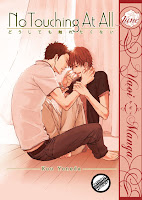 No Touching At All by Kou Yoneda. One thing that I’ve seen mentioned in most reviews for No Touching At All are problems with the translation; I’ll admit, it’s not the best that I’ve seen. But for me, the strength of the story and strength of the characters ultimately won out—I loved No Touching At All. Shima’s awkward introversion actually reminded me a lot of myself which was probably one of the reasons that I connected so well with the manga. He has difficulty accepting his own feelings and even more trouble accepting the feelings of others. Togawa on the other hand is more confident and straightforward. I found both of the lead characters to be realistic and their relationship believable.
No Touching At All by Kou Yoneda. One thing that I’ve seen mentioned in most reviews for No Touching At All are problems with the translation; I’ll admit, it’s not the best that I’ve seen. But for me, the strength of the story and strength of the characters ultimately won out—I loved No Touching At All. Shima’s awkward introversion actually reminded me a lot of myself which was probably one of the reasons that I connected so well with the manga. He has difficulty accepting his own feelings and even more trouble accepting the feelings of others. Togawa on the other hand is more confident and straightforward. I found both of the lead characters to be realistic and their relationship believable.
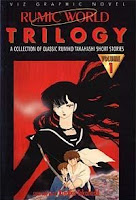 Rumic World Trilogy, Volumes 1-3 by Rumiko Takahashi. Rumic World Trilogy is a collection of short manga of varying lengths by Rumiko Takahashi, mostly from early in her career. As with most short story collections, the stories tend to be hit-or-miss but Takahashi generally hits. Most of the stories in the Rumic World Trilogy tend towards the comedic although there are a few that are more serious, too. Rumic World Trilogy is not my favorite manga by Takahashi, but for the most part I enjoyed it. Probably my least favorite story was “Wasted Minds.” I found parts of it to be very amusing, but the five-part series seemed to drag on too long. I preferred the shorter stories which forced Takahashi to focus her storytelling a bit more.
Rumic World Trilogy, Volumes 1-3 by Rumiko Takahashi. Rumic World Trilogy is a collection of short manga of varying lengths by Rumiko Takahashi, mostly from early in her career. As with most short story collections, the stories tend to be hit-or-miss but Takahashi generally hits. Most of the stories in the Rumic World Trilogy tend towards the comedic although there are a few that are more serious, too. Rumic World Trilogy is not my favorite manga by Takahashi, but for the most part I enjoyed it. Probably my least favorite story was “Wasted Minds.” I found parts of it to be very amusing, but the five-part series seemed to drag on too long. I preferred the shorter stories which forced Takahashi to focus her storytelling a bit more.
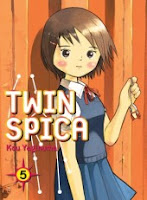 Twin Spica, Volumes 5-8 by Kou Yaginuma. It makes me sad that the English release of Twin Spica hasn’t been more successful; I think it’s a wonderful series. From the very beginning of the newly established astronaut training program in Japan it has been made clear that only a few students will actually be given the opportunity to go to space. Asumi and her friends are mostly concentrating on their immediate coursework, but things will soon get more competitive—they all want a chance at space. Twin Spica primarily focuses on the feelings and relationships of its characters. Even with all of the science fiction elements (which I love), they feel like authentic people.
Twin Spica, Volumes 5-8 by Kou Yaginuma. It makes me sad that the English release of Twin Spica hasn’t been more successful; I think it’s a wonderful series. From the very beginning of the newly established astronaut training program in Japan it has been made clear that only a few students will actually be given the opportunity to go to space. Asumi and her friends are mostly concentrating on their immediate coursework, but things will soon get more competitive—they all want a chance at space. Twin Spica primarily focuses on the feelings and relationships of its characters. Even with all of the science fiction elements (which I love), they feel like authentic people.
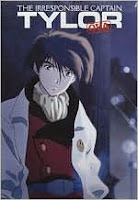 The Irresponsible Captain Tylor: OVA Series directed by Kōichi Mashimo and Naoyuki Yoshinaga. I had a lot of fun watching the initial anime series of The Irresponsible Captain Tylor and so made a point to seek out the OVA series as well. Unfortunately, the OVA series somehow lacks the charm of the original and I wasn’t as impressed by it. However, it was great to have the opportunity to spend more time with the characters. The OVA episodes, which take place not long after the original series ends, tend to focus on individual characters rather than the crew as a whole. I think this might be where the series goes astray—the characters seem to work better as a cast ensemble than on their own. Still, even if I didn’t like the OVA series as much as the original, I was entertained.
The Irresponsible Captain Tylor: OVA Series directed by Kōichi Mashimo and Naoyuki Yoshinaga. I had a lot of fun watching the initial anime series of The Irresponsible Captain Tylor and so made a point to seek out the OVA series as well. Unfortunately, the OVA series somehow lacks the charm of the original and I wasn’t as impressed by it. However, it was great to have the opportunity to spend more time with the characters. The OVA episodes, which take place not long after the original series ends, tend to focus on individual characters rather than the crew as a whole. I think this might be where the series goes astray—the characters seem to work better as a cast ensemble than on their own. Still, even if I didn’t like the OVA series as much as the original, I was entertained.


